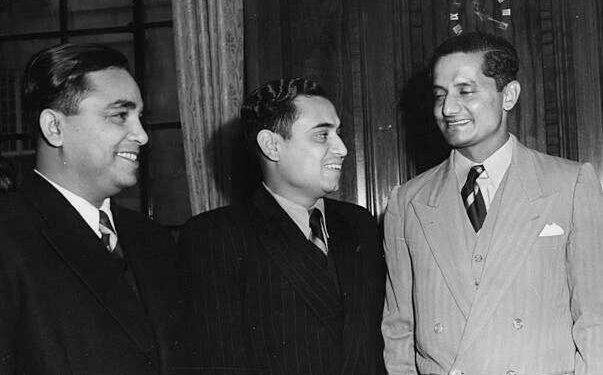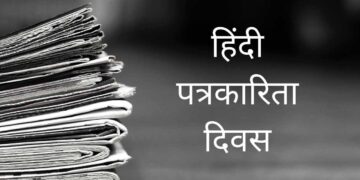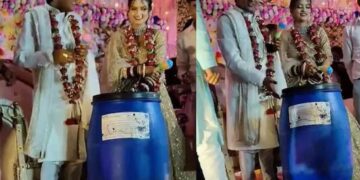Shyamji Krishna Varma (English: Shyamji Krishna Varma, born: October 4, 1857; died: March 31, 1930) is one of those immortal sons of India who devoted his entire life for India’s independence. Fed up with the atrocities of the British government, Shyamji Krishna Verma, who left India for England, spent his entire life in creating an environment for India’s independence and inspiring the youth. Shyamji Krishna Verma, who became vocal after living in the company of Swami Dayanand Saraswati and got the reputation as a prominent scholar of Sanskrit and Vedas, held the post of Diwan of the then Ratlam state from 1885 till 1889.
Shyamji Krishna Verma was born on October 4, 1857 in Mandvi village of Gujarat. Shyamji Krishna Verma started working for Swaraj in 1888 while practicing law in Ajmer. He worked for public welfare by serving as Diwan in Ratlam in Madhya Pradesh and Junagadh in Gujarat. In 1897 he again went to England. Struggled against the excesses of Lord Curzon in 1905. In the same year, the monthly ‘The Indian Sociologist’ was published from England, which was later published in Geneva also. While staying in England, he established India House. After returning to India in 1905, he founded the Indian Home Rule Society with revolutionary students. Shyamji Krishna Verma was inspired by Lokmanya Bal Gangadhar Tilak and Swami Dayanand Saraswati. He represented India in the Vidya Conferences held in Berlin and England in 1918. Shyamji Krishna Verma was the first Indian to mobilize the resolve for independence through revolutionary activities, who received M.A. from Oxford. And had received the titles of Barrister. Impressed by his Sanskrit speech given in Pune, Monier Williams made Vermaji assistant professor of Sanskrit at Oxford.[1]
Shyamji Krishna Verma completed his B.A. from Oxford University in 1883 AD. Apart from being the first Indian to obtain a degree, he was the first Indian to inspire Indian youth abroad and organize revolutionaries to remove the British rule. Maharishi Dayanand Saraswati, the founder of Arya Samaj, who taught the first lesson of patriotism to Pt. Shyamji Krishna Verma was. In 1875 AD, when Swami Dayanand ji established Arya Samaj in Bombay (now Mumbai), Shyamji Krishna Verma was among its first members. Sitting at the feet of Swamiji, he self-studied Sanskrit texts. He was also a member of the Paropkarini Sabha founded by Maharishi Dayanand. He was also the manager of Maharishi Dayanand’s Veda Bhashya, published from Bombay. Returned to India in 1885 AD after passing the barrister examination with the highest degree in Sanskrit. With a view to strengthen the efforts of the freedom movement in England, Shyamji Krishna Verma ji published a monthly newspaper in English named ‘Indian Sociologist’ from January 1905. On February 18, 1905, he established the ‘Indian Home Rule Society’ in England itself and declared that our objective is “to establish a government of Indians by Indians for Indians.” To put the declaration into action, ‘India’ House, which was the biggest center of Indian political activities and activities in England.[2]
Pt. Shyamji Krishna Verma considered non-cooperation with the government as the main means of achieving India’s independence. You believed and used to say that if Indians stopped supporting the British, the British rule could collapse overnight. Despite being a supporter of peaceful measures, Shyamji was not in favor of abandoning violent measures to achieve independence. His claim was that the British were the most organized gang involved in looting and killing the Indian people. As long as the British provide freedom to agitate for independence, there is no need for violent measures, but when the government imposes restrictions on the freedom of press and speech, and uses severe repressive measures, then Indian patriots have the right to They should use all necessary means of all kinds to attain freedom. He believed that our main means of action is not bloody means, but the means of boycott. The day the British will not be able to keep their servants in India, will be unable to recruit soldiers in the police and army, that day the British rule in India will become a thing of the past. He had written in the first issue of his monthly magazine Indian Sociologist that resistance to a tyrannical ruler is not only justified but also necessary and in the end he also stressed that the subjugated caste should be armed to overthrow the tyrannical and oppressive rule. The path of struggle should be adopted.[2]
Shyamji Krishna Verma Srijan Peeth has also been established in Ratlam. Mandvi, the birthplace of Shyamji Krishna Varma, is being developed as Gujarat Kranti Teerth. Where the statues of freedom fighters and a revolutionary forest of 21 thousand trees are taking shape. A gallery of the introduction story of freedom fighters is proposed in Ratlam itself, so that the basic elements of Indian independence can be remembered and research work related to them can be carried forward, but for this, Ratlam District Administration and Madhya Pradesh Government.
Revolutionary martyr Madanlal Dhingra was one of his disciples. He also started a scholarship on his martyrdom. Veer Savarkar did writing work under his guidance. He died in a hospital in Geneva on March 31, 1933.
It was not normal to talk about the liberation of India from the British soil from across the seven seas, such was the intensity of his patriotism, his faith in independence was so strong that Pt. Shyamji Krishna Verma had expressed this wish even before his death. That after his death the ashes should be taken to the land of independent India. He died in Geneva on March 31, 1930, 17 years before Indian independence. 73 years after his death, 56 years after independent India, in 2003, the ashes of the son of Bharat Mata came to the country on the initiative of Gujarat Chief Minister Narendra Modi. Got success in bringing.[3]






